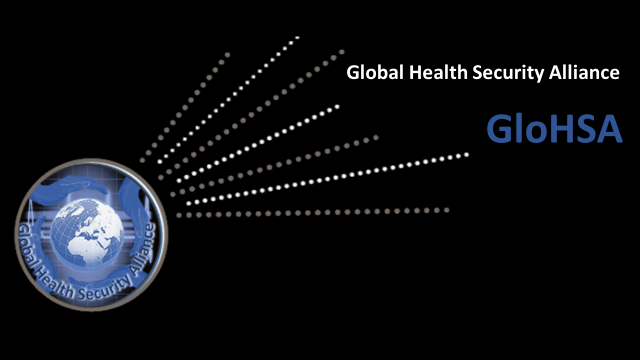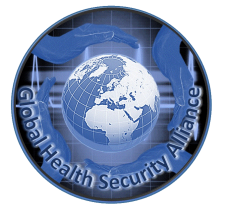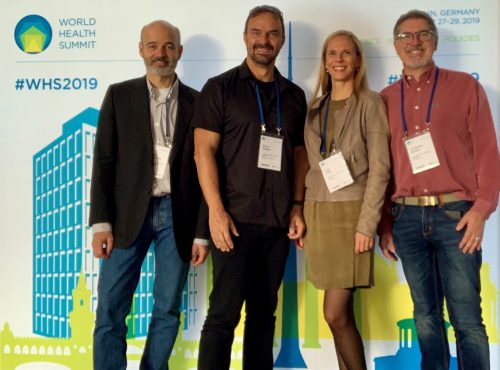- Have any questions?
- info@glohsa.com

DRC: MSF suspends medical activities after Ebola Treatment Center attack
2. March 2019
GloHSA supporting the KAIPTC in Ghana
5. December 2019In Berlin on October the 28th, a GloHSA delegation attended the World Health Summit 2019 (WHS 2019) at the KOSMOS.
Looking at the high quality of contents and expertise of speakers within the numerous panels at the 2019 WHS tending to cover the wide range of the Global Health and Security field, GloHSA participants found that still the nexus between both terms should be identified in a much wider approach in order to overcome the given limitations acknowledged by numerous lecturers.
As an example, the session dedicated to a comprehensive approach to global health and security chaired by Prof Carlo Masala highlighted the point that an optimized holistic approached is needed in situations like the latest Ebola outbreak in Eastern Congo. Stakeholders dealing with this combination of an outbreak in a warzone are facing a complex set of actors in a conflict situation, a variety of militias and armed groups with very different interests and share the space with multiple actors such as WHO, NGOs, local health systems with various objectives and expectations that sometimes even differ from the population needs and habits.
All speakers used the term “Global Health Security”. However, this term is challenging because of a possible gap between the given perception of the compliance of a given health system with the International Health Regulations (IHR) requirements from the policy makers and the auditors point of view and the actual ability of this health system to cope with an actual challenge. Beyond the current Ebola outbreak, the Sierra-Leone situation in 2014 is another perfect example: ‘Health security in Sierra Leone prior to the 2014 Ebola outbreak did exist – on paper. […] The appearance of disease preparedness was good enough for the international community, until it wasn’t, as in 2014 when Ebola broke out’[1] Jane Ruth Aceng, Minister of Health of Uganda, Michael Ryan executive director of the health emergencies program of the WHO and Hans-Ulrich Holtherm Director of Military Medicine Science and Capability Development of the German Armed Forces stated that the health system in Uganda proves to be resilient thanks to a strict policy regarding Health Intelligence and Public Health aspects of the threat (systematic vaccination of any incoming refugee as an example). Minister Aceng focused on three significant words “Leadership, Preparedness, Surveillance” as a slogan for government resilience.
Obviously, the speakers acknowledged that Global Health Security challenges not only mean ensuring health security from disease threats and improving access to care for those in lower-middle and low, income countries, but it means a reliable and sound protection for high and upper-middle income countries from all kind of health threats as well. This is a welcomed widening of everybody’s understanding, but is still only a small piece of the nexus.
“Preventing a crisis is more sustainable than preparing for dealing for the crisis » said by Pr Carlo Masala and thus indicates the two major fields of prearrangements for the next outcome. Preventing a disaster is in most cases the better alternative than trying to mitigate the consequences of a major outbreak (although mitigating capabilities remain of utmost importance). A robust network of surveillance would be a great and necessary achievement here, however the arrangements for preparedness need to stay in the same height of prioritization.
Following the understanding of Global Health Security by GloHSA this preparedness also includes a global surveillance of national health systems cause they have the same impact to security like all the other defined security sectors of a country or area. Thus, a strong health system fosters a strong security sector and vice versa, because that nexus lies at the heart of the resilience of a state and its society.
So what is on top of the “To do” list? In order to provide sound advices to key decision makers some call for mentors and mentorship-training, as they believe they are essential[2]. Others claim that there is a need for better communication and joint work between international relations theorists and global health politics scholars[3].
But, so far, insights from classic and contemporary international theory such as realism, neoliberal institutionalism, constructivism and others failed to provide sufficient material to develop fully satisfactory global health politics insights or advices.
In fact, Global Health Security challenges require a comprehensive approach and multidisciplinary teams, gathering stakeholders who are equipped with data analysis/interpretation tools & skills, expertise in politics, in international relationships, in healthcare management, in ethics, and other advanced capabilities along with a good sense on how to provide sound advices without confusing with eliciting decisions among key decision makers.
This is exactly what we aim to provide at the Global Health Security Alliance (GloHSA). GloHSA is capable to disseminate useful tools based on sound doctrine, concepts and methodology are readily available – such as Cindynics and alike- to achieve such an holistic approach.
[1] Erikson, S. (2019). Faking global health. Critical Public Health, 29(4), 508-516.
[2] Katz, F., & Glass, R. I. (2019). Mentorship Training is Essential to Advancing Global Health Research. The American journal of tropical medicine and hygiene, 100(1 Suppl), 1.
[3] Nathan Paxton & Jeremy Youde (2019) Engagement or dismissiveness? Intersecting international theory and global health, Global Public Health, 14:4, 503-514, DOI: 10.1080/17441692.2018.1500621





